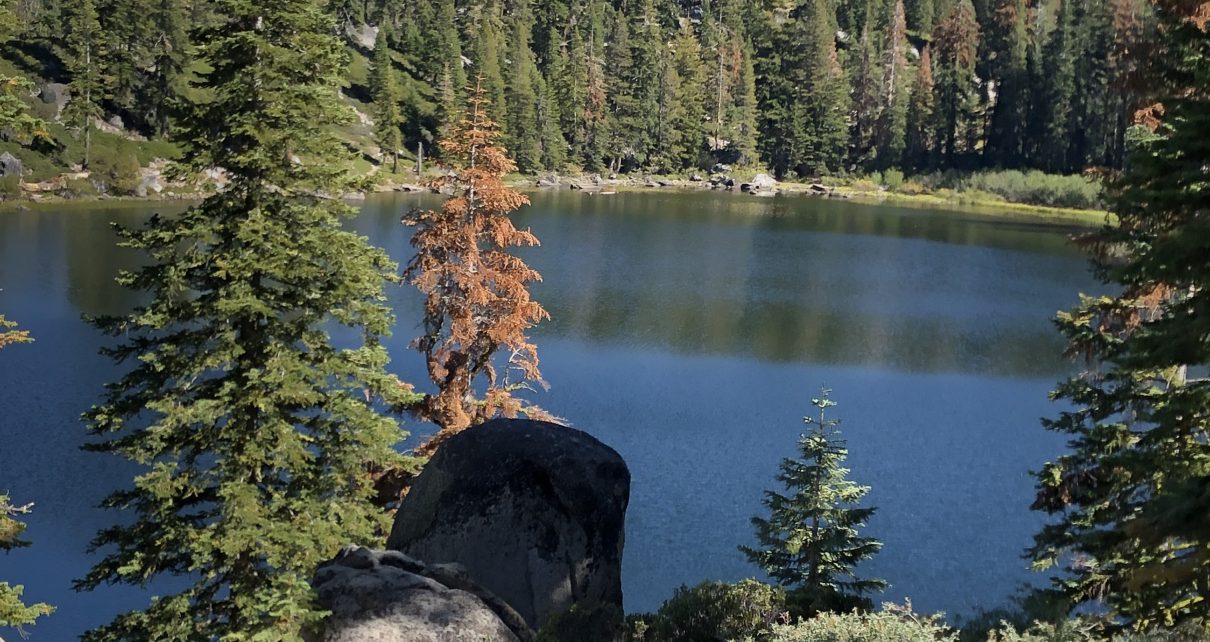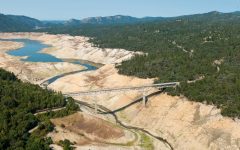
El Dorado National Forest, California. (Photo: Katy Grimes for California Globe)
Proven Forest Management Act Passes House Natural Resources Committee
Under NEPA, a simple forest-thinning project requires an average of four years of environmental studies and reports often exceeding 800 pages
By Katy Grimes, July 11, 2023 3:22 pm
California Congressman Tom McClintock (R) has warned for many years: “Excess timber comes out of the forest one way or the other: it is either carried out or it burns out. From the inception of the U.S. Forest Service, we managed our public lands according to sound forest management principles. We prevented overcrowding by removing excess timber so that trees had room to grow healthy and strong. This assured not only resilient forests, but also a thriving economy throughout our mountain communities and an important revenue stream to the treasury that was available for additional improvements to the public lands.”
The following is from Rep. Tom McClintock (R): his remarks in the Federal Lands Subcommittee of the House Natural Resources Committee Mark-up Hearing on H.R. 188, June 13, 2023.
The Proven Forest Management Act – H.R. 188 – extends existing law that was passed with bi-partisan support and signed by President Obama as part of the WINN Act in 2016. That law provided for a categorical exclusion from the National Environment Policy Act for forest thinning projects up to 10,000 acres under certain conditions in the Tahoe Basin.
H.R. 188 expands throughout the entire National Forest System the categorical exclusion for forest management projects that was secured for the Tahoe Basin in the 2016 WINN Act.
Mr. Chairman:

I want to thank the sub-committee for hearing H.R. 188.
H.R. 188, the Proven Forest Management Act, extends an existing law, passed with bi-partisan support and signed by President Obama in 2016. That law provided a categorical exclusion from the National Environmental Policy Act for forest thinning projects up to 10,000 acres under certain conditions, within the Tahoe Basin.
Under NEPA, a simple forest-thinning project requires an average of four years of environmental studies that produce reports often exceeding 800 pages. They cost millions of dollars to produce – often more than the value of the timber we are removing. Federal timber auctions that once produced millions of dollars to the federal government now cost money, so not a lot gets done. Federal timber harvests in the Sierra have declined 80 percent as a result.
The Lake Tahoe Categorical Exclusion has now been in effect for eight years. It has taken the review time for thinning projects from four years down to less than four months. It has cut the reports from 800 pages to a few dozen. Under this authority, the Tahoe Basin Management Unit has increased the removal of excess timber from one million board feet a year to an average of nine million board feet. Treated acreage in the Tahoe Basin has now tripled.
When the Caldor Fire broke out in 2021, it was out of control and bearing down on the City of South Lake Tahoe. But the fire hit a tract on the Pioneer Trail that had been treated under the new authority. It lay down and firefighters were able to stop it. South Lake Tahoe was saved.
The town of Grizzly Flats wasn’t so lucky. It’s next door in the El Dorado National Forest. For more than a decade, land managers have tried to thin the Trestle Project, that everyone knew was a clear threat to Grizzly Flats. It was held up by environmental laws and the endless litigation arising from them and still had not been undertaken when the same Caldor Fire incinerated the entire town.
The Amendment in the Nature of a substitute makes a few technical changes based on feedback from the Forest Service to ensure that this bill is successful at delivering better forest health results across the nation.
Specifically, it includes changes to ensure that all of our National Forests and public lands managed by the BLM will benefit from the expedited active forest management provided by this legislation. In addition, this ANS addresses some concerns raised by the Forest Service to ensure that responsible forest management projects do not suffer delays due to frivolous lawsuits.
Mr. Chairman, remember, only YOU can prevent forest fires. Maybe not all of them, but I can say with confidence that this bill will minimize many forest fires and save many communities from the catastrophe visited on towns like Grizzly Flats. Let’s not waste any more time.
- Assemblyman Essayli Files Ethics Complaint Regarding Alleged Bribery, Corruption by Legislator - December 12, 2024
- Assemblyman DeMaio Releases 7-Point Plan to Overhaul ‘Broken’ CA Republican Party - December 12, 2024
- Governor Newsom ‘Stands in Solidarity’ with Central Valley Child - December 12, 2024





Extremely persuasive argument from Congressman Tom McClintock.
What a difference this will make.
Fingers crossed here for full passage of this bill.
This is sensible legislation but no doubt the uniparty of Democrats and RINOs will ensure that it will never be passed?
During the last fires threatening South Lake Tahoe, an interview was going on and in the background all of the trees were about the same girth. Why? Fire has visited many times before that. Why am I the only one who noticed?
Unmanaged forests are just a king sized version of weeds waiting for a spark!
Happy birthday, Tom McClintock! One of the FEW SANE, INTELLIGENT California politicians….
OH how we wish that he had won the Governorship from Ahhhnold….
I am all for it, but the environmentalists have also succeeded in destroying the 100yr old infrastructure that supported timber sales. There used to be at least one saw mill in most mountain towns, now the only ones I know are in Lincoln, CA. and Quincy, CA. ,with a new one in Carson City, NV. The cost of trucking timber to a mill is costly now, so most of the thinning will be paid by the government.
It’s funny, the government is the largest land owner in the state of Calif. , this land has no taxes on it. This land used to generate money paid to the government for the harvest of timber, producing and entire economy around it, in labor and services.
The next biggest land owner in Calif. is Sierra Pacific, the nemesis of the Sierra club. Sierra Pacific can not even log its own land, without being environmentally sued to the point that it is not economically viable. So mill after mill shut down.
I grew up in a mill town and in the 1990’s the bay area transplants started to retire up in the hills, that’s when it started. These dirty footed hippies, who ended up becoming wealthy, moved to the hills and were shocked at the logging they encountered on their nature hikes,…not realizing that the forest had already gone through a second, if not a third harvest previously.
Now these old hippies are clamoring for something to be done because their property is threatened, not realizing THEY broke Humpty Dumpty….
OBTW, here is a link to Mr. McClintock’s 2018 article.
https://www.wsj.com/articles/only-good-management-can-prevent-forest-fires-11545090601
He’s been on it for a long time.
This bill is about cutting down trees in national forests. And who gets these trees? Logging companies. Who cares about national forests and THE PUBLIC as long as the logging companies get their fill of trees. Whatever trees the logging company wants, they will get no matter what the detrimental effect to national forests. If a Republican wants it – it’s bad for the public, bad for the economy, bad for democracy.